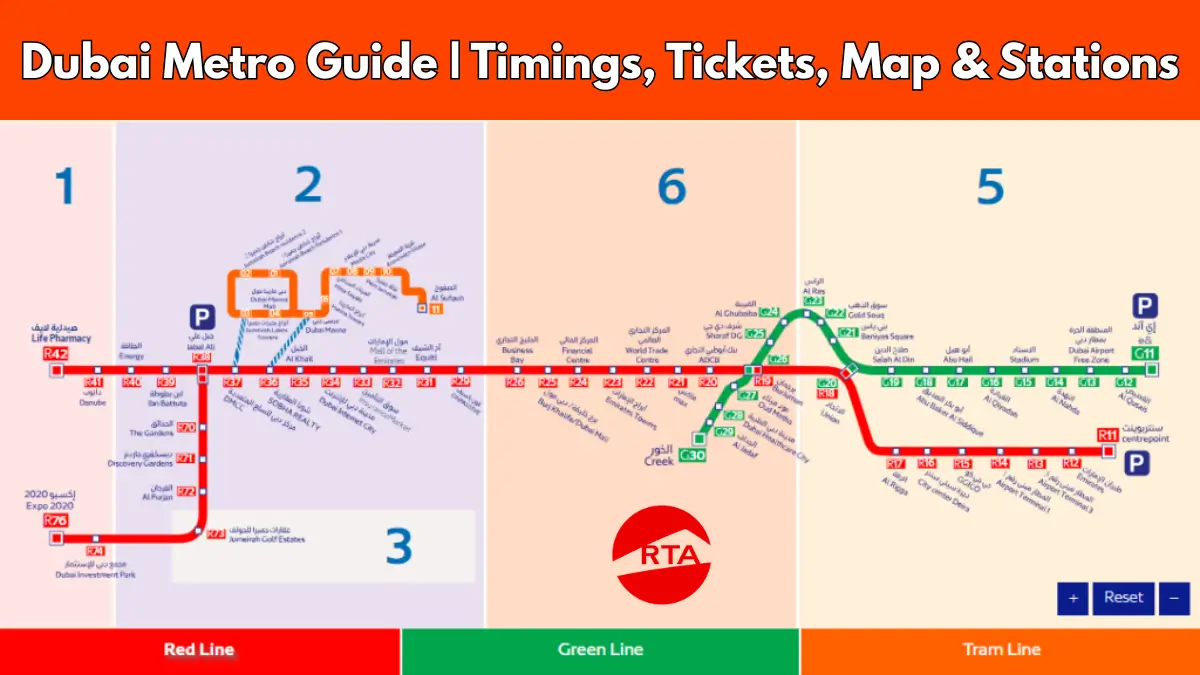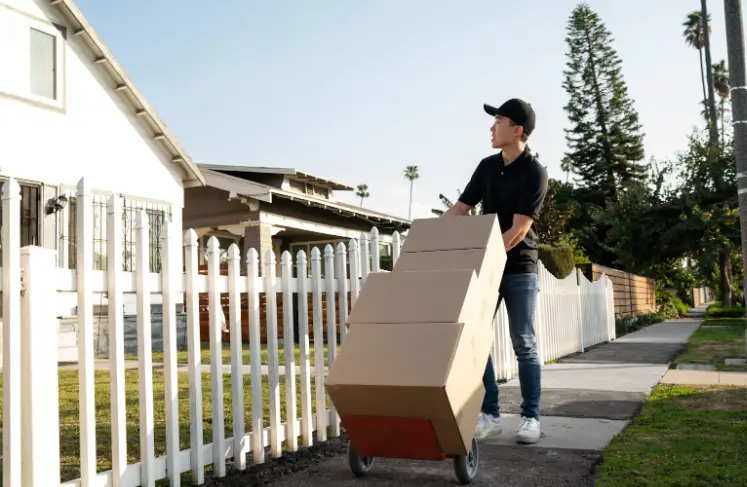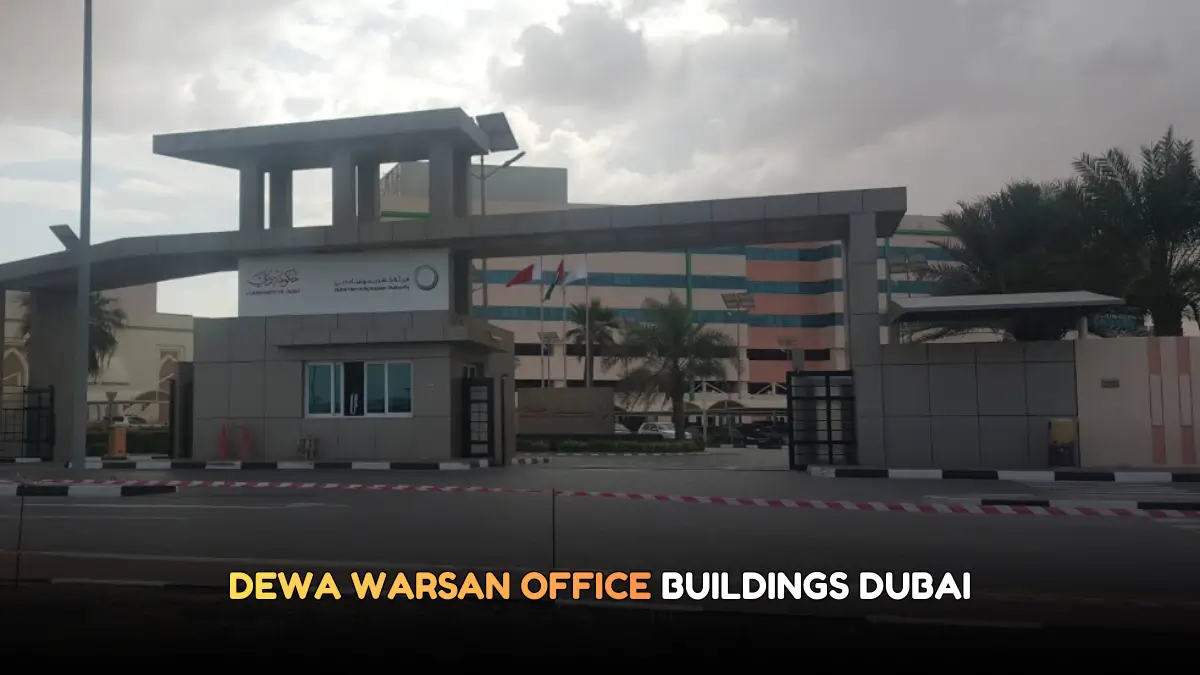
From rising skyscrapers and sprawling deserts to the hidden infrastructure that sustains the connection and convenience of this extravagant destination, Dubai is a breathtaking city defined by ambition, modernity, and luxury. Even for first-time visitors, the uninterrupted trains and hyper-modern Dubai Metro offer quick and seamless travel around the city, utilizing advanced technology and clean infrastructure the city is proud of. Whether you’re a tourist, busy resident, or business operator, the Dubai Metro allows you to access all the city has to offer with minimal traffic. The skyline captured through the Dubai Metro provides a glimpse into the future as it moves along its ultra-modern rail with nonstop convenience.
This guide to the Dubai Metro is designed to ensure your trips are as effortless and relaxed as possible. It covers Dubai Metro operating hours, ticket options, and metro maps, including the most significant stations and lines. With this knowledge, you’ll be able to navigate Dubai efficiently and make the most out of one of the most remarkable public transportation systems in the world.
The Concept Behind the Dubai Metro
The Dubai Metro is the epitome of ambition and innovation. Structured by the Roads and Transport Authority (RTA) to address growing traffic jams, cater to eco-consciousness, and accommodate Dubai’s growing population and economy, the Dubai Metro has evolved into a world-class public transportation system.
The development of the Dubai Metro began in 2005 and culminated in the launch of the Red Line in 2009. On the night of September 9, 2009, at precisely 9:09:09 PM, His Highness Sheikh Mohammed bin Rashid Al Maktoum, the Vice President and Prime Minister of the UAE and Ruler of Dubai, gave a speech marking the completion of the Red Line. This was the moment the world’s longest, fully automated metro system was born—the first of its kind in the Middle East.
After the Red Line’s completion, the Green Line was added to connect more areas, expanding Dubai Metro’s reach. In 2020, the Route 2020 extension was introduced, adding to the metro’s capacity, including access to the site of Expo 2020.
Examining Dubai Metro Lines
The Red Line
The Red Line is the longest line, running 52.1 kilometers from Rashidiya to UAE Exchange (formerly Jebel Ali). It connects key landmarks, major residential areas, and business hubs. Travelers arriving at Dubai International Airport (DXB) will find this line especially convenient.
The Green Line
The Green Line is more historic, running 22.5 kilometers and connecting Bur Dubai and Deira, two of the oldest and most vibrant areas of the city. This line offers easy access to Dubai’s traditional markets, cultural sites, and heritage spots.
| Green Line Route | Red Line Route |
|---|---|
| Al Qusais | Rashidiya |
| Dubai Airport Free Zone | Airport Terminal 3 |
| Al Nahda | Burj Khalifa/Dubai Mall |
| Stadium | Business Bay |
| Al Jadaf | Jumeirah Lake Towers |
| Dubai Healthcare City | Dubai Marina |
| Oud Metha | Jumeirah Beach Residence |
| Emirates | Al Karama |
| Al Qiyadah | Al Quoz |
| Deira City Centre | Sharaf DG |
| Al Ras | Al Barsha |
| Gold Souq | Uptown Mirdif |
| Burjuman | Dubai Internet City |
| Khalid Bin Al Waleed | Umm Suqeim |
| Al Karama | Al Jafiliya |
| Riyadh | Rolla |
| Al Jaddaf | Al Safa |
| Dubai Design District | Al Barsha 1 |
| Business Bay | Dubai Financial Center |
| Dubai Mall | Al Wasl |
Dubai Metro Timings
General Operating Hours
Here’s a quick overview of the typical Dubai Metro operating hours:
| Day | Timings |
|---|---|
| Sunday | 5:30 AM – 12:00 AM |
| Monday | 5:30 AM – 12:00 AM |
| Tuesday | 5:30 AM – 12:00 AM |
| Wednesday | 5:30 AM – 12:00 AM |
| Thursday | 5:30 AM – 12:00 AM |
| Friday | 5:30 AM – 1:00 AM |
| Saturday | 5:30 AM – 12:00 AM |
Peak Hours and Off-Peak Hours
-
- Peak Hours: Weekdays from 6 AM to 9 AM and 4 PM to 7 PM.
-
- Off-Peak Hours: Middle of the day and late evening, when trains are less crowded.
Train Frequency
-
- During peak hours, trains arrive every 4 minutes.
-
- Off-peak times see trains every 5 to 7 minutes.
Start and End Timed Trains
-
- The first and last train timings vary slightly depending on the station, with the first train being later and the last train earlier for intermediate stations.
Real-Time Train Information
-
- RTA Smart Apps: The ‘RTA Dubai’ and ‘S’hail’ apps provide schedules, planners, and live updates.
-
- Station Displays: Digital screens show train arrival times.
-
- Official RTA Website: Offers timetables and other important information.
Dubai Metro Tickets and Fares: Nol Card Orientation
The Nol Card is used for all RTA public transport in Dubai, including the metro, buses, trams, and water taxis. It simplifies the fare process, removing the need for coins.
Nol Card Purchase and Recharge Procedures
-
- Metro Stations: Available at ticket vending machines and customer service counters.
-
- RTA Customer Service Centers: Located at major bus stations and RTA centers.
-
- Authorized Retailers: Nol Cards can be topped up at supermarkets like Carrefour and Spinneys.
-
- RTA Smart Apps and Website: You can also top up your Nol Card online.
Fare Zones and Calculation
Dubai Metro is divided into seven fare zones, and fares depend on the number of zones traveled. The Nol Card tracks your journey and charges accordingly.
Example Fare Zones:
-
- Zone 1: Travel within a single zone
-
- Zone 2: Travel between two zones
-
- Zone 3: Travel across five zones
Special Fares/Concessions
-
- Children under 5 and shorter than 90 cm: Free access
-
- People of Determination: Free travel with a Blue Nol Card
Nol Card Tips
-
- Tap In and Tap Out: Always tap in at the entrance and tap out at the exit to avoid being charged the maximum fare.
-
- Maintain Balance: Ensure your Nol Card balance is sufficient for your journey (at least AED 7.50).
-
- Check Balance: You can check your balance at ATM machines, customer service centers, or via the RTA apps.
Reading the Dubai Metro Map and Stations
The Dubai Metro map is crucial for understanding the layout and planning your journey. It shows the color-coded lines, station numbers, interchanges, and major landmarks.
Key Map Features:
-
- Lines and Colors: Red Line and Green Line are represented in their respective colors.
-
- Station Names and Numbers: All stations are listed with corresponding numbers.
-
- Interchange Stations: Union and Burjuman are key interchanges connecting the Red and Green Lines.
-
- Key Landmarks: Major attractions like Burj Khalifa, Dubai Mall, and Dubai Creek are marked on the map.
Where to Find the Map?
-
- At Stations: Large printed maps are available.
-
- Online: Download the latest map from the RTA website.
-
- RTA Smart Apps: Interactive maps are available through the RTA Dubai and S’hail apps.
-
- Tourist Information Centers: Printed maps are available for free.
Station Amenities
Dubai Metro stations are equipped for passenger comfort, featuring:
-
- Customer Service Offices: For assistance and information.
-
- Ticket Vending Machines: For purchasing and recharging Nol Cards.
-
- Restrooms and Prayer Rooms: Available at many stations.
-
- Shops and Food Outlets: Convenience stores and coffee shops at larger stations.
-
- Accessibility Features: Elevators, ramps, tactile paths, and designated spaces for People of Determination.
-
- Emergency Services: First aid kits and trained personnel are available at every station.
Types of Cabins:
-
- Standard Cabin (Silver Class): Most common and comfortable.
-
- Gold Class Cabin: Luxury seating with panoramic views, accessible with a Nol Gold Card.
-
- Women and Children Cabin: A dedicated space for women and children.
Connectivity
Dubai Metro stations are strategically located to connect with other transport options:
-
- Feeder Buses: Connect metro stations to surrounding areas not directly served by the metro.
-
- Dubai Tram: Connects with the Red Line at Sobha Realty and DMCC stations.
-
- Taxis: Available near most metro stations for further travel.
-
- Water Transport: Access to traditional Abra rides from stations on the Green Line.
Helpful Hints for Navigating the Dubai Metro Like a Local
Common Courtesy and Policies:
-
- No Eating or Drinking: Eating and drinking are not allowed on the metro.
-
- Designated Seating: Seats are reserved for the elderly, pregnant women, and People of Determination.
-
- Quiet Zones: Keep noise levels to a minimum.
-
- Photography: Casual photography is allowed, but filming others without consent is prohibited.
-
- Stand on the Right: Stand on the right side of escalators to allow others to pass on the left.
-
- No Smoking: Smoking is prohibited throughout the metro system.
Safety and Security:
-
- CCTV Surveillance: Stations and trains are monitored for safety.
-
- Emergency Call Buttons: Available on trains and platforms for immediate assistance.
-
- RTA Personnel: Available at all stations to assist passengers.
Access for People of Determination:
-
- Elevators and Ramps: Every station is accessible to those with mobility challenges.
-
- Tactile Paths: Available for visually impaired passengers.
-
- Designated Spaces: Trains feature spaces for wheelchair users.
Using the Metro to Explore Dubai
The Dubai Metro is more than just a mode of transport; it’s an excellent way to explore the city’s landmarks.
Key Attractions Accessible by Metro:
-
- Burj Khalifa/Dubai Mall: Get off at Burj Khalifa/Dubai Mall Station for the world’s tallest building and one of the largest malls in the world.
-
- Jumeirah Marina/Dubai Marina: Use Sobha Realty or DMCC stations to explore the waterfront and nightlife.
-
- Old Dubai: Visit Al Ras and Al Ghubaiba stations to explore traditional markets like the Gold and Spice Souks.
Connecting to Other Transport:
-
- Dubai Tram: Change at Sobha Realty and DMCC stations.
-
- Feeder Buses and Taxis: For areas not directly served by the metro.
-
- Water Transport: Use Green Line stations for Abra rides across Dubai Creek.
Conclusion
The Dubai Metro is a symbol of the city’s urban development, offering world-class transportation that is fast, efficient, and eco-friendly. Whether you’re commuting or exploring the city, the metro makes it easy to navigate Dubai, giving you access to everything from modern skyscrapers to historic souks. The Dubai Metro is more than just a transit system; it’s an essential part of the city’s DNA and an icon of convenience and sustainability.
Share this article
Written by : UAE Script Staff
Follow us
A quick overview of the topics covered in this article.
Latest articles
February 3, 2026
February 3, 2026
February 3, 2026


